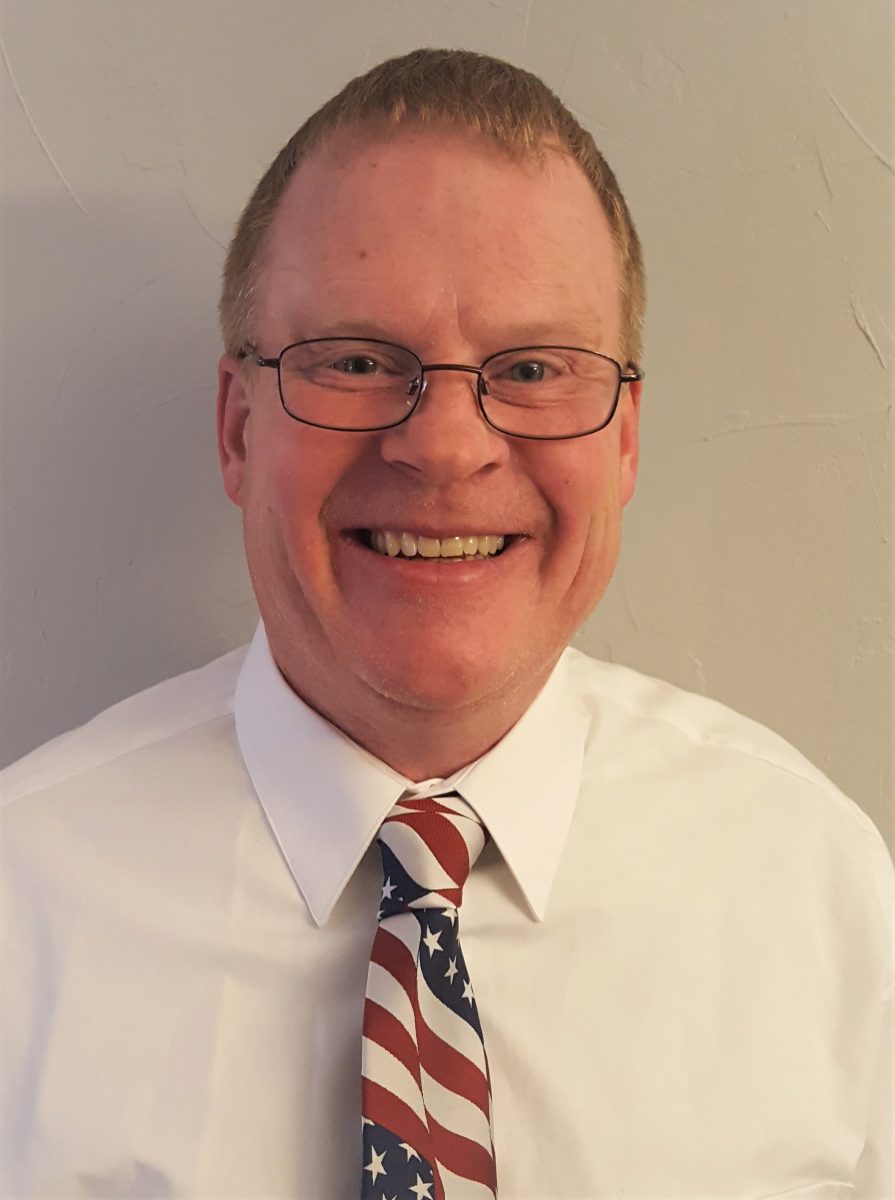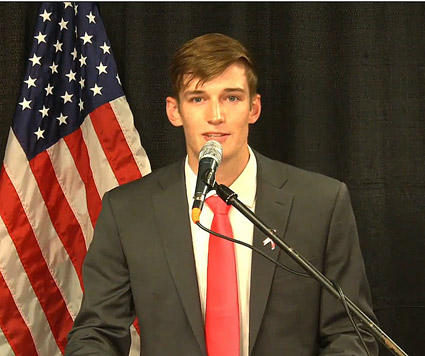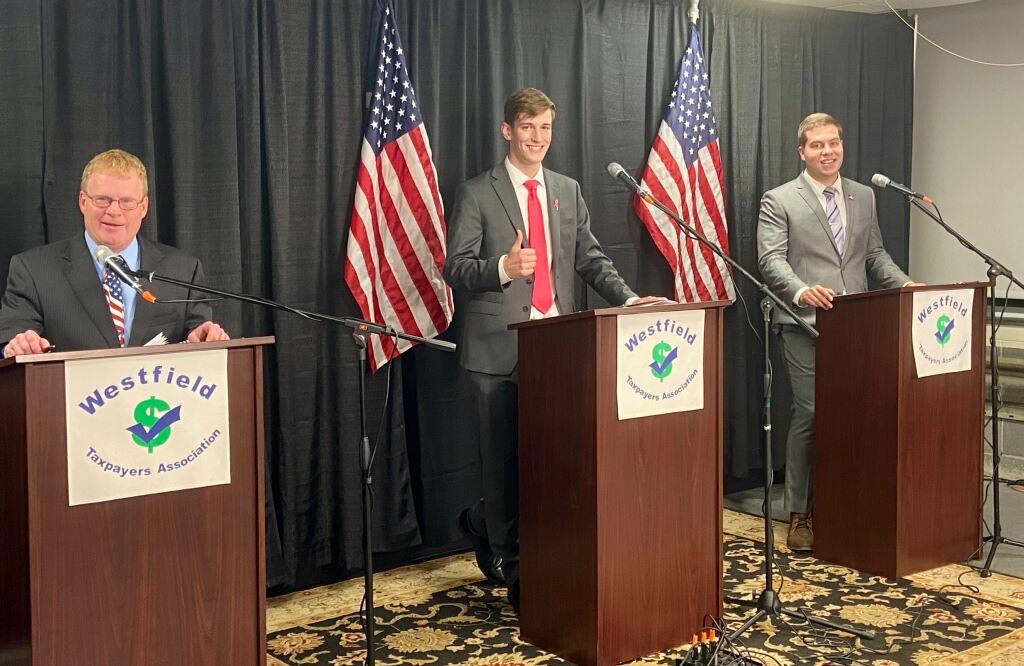A Wild, Wild Westfield Ride for Rep, in an Uncommon Time…
WESTFIELD—The special senate election here did not have much drama. For much of the official campaign and nearly a year before that unofficially, the political soothsayers felt it was then-Rep John Velis’ to lose. They were right. There were prophecies about his former House seat, too, but drama and twists made the race less and less predictable.
Four candidates are running for the 4th Hampden House district. There is a Democrat, a Republican, a right-leaning independent and a write-in candidate. Democrat Matthew Garlo faced no opposition in his primary, but Republican Kelly Pease did. Though at-large councilor Daniel Allie fell to Pease, Allie launched a write-in campaign. Also on the ballot is unenrolled candidate Ethan Flaherty.
This spectrum of ages and philosophies present voters with nuanced choices forcing candidates to game out how each of their opponents affects the path to victory.
The 4th Hampden district covers the entirety of the city of Westfield.
Democrats nearly had no candidate. In another special election back in 2014, Velis became the first Democrat to hold the seat in decades. Westfield almost militantly plants itself in the middle. Donald Trump was the first Republican presidential candidate to win the city in 32 years, but the city has wobbled between the parties in other races.
Despite being a city for 100 years, the coalitional politics of both bigger and smaller cities in the 413 can be less impactful. Rather, its politics are like that of a big town. Little league connections and knowing neighbors can make or break races.
Before the coronavirus seized the world, Velis’ Senate election had been slated for March 31—enough time for prospective seat-seekers to wait until the results to file. None had by the time the election moved. Garlo, who had been holding signs and talking to voters for Velis, felt it was time.
“I really just got thinking that, hey, it’s not too late for me to get involved in this and really keep moving the needle in Westfield,” he said.
Garlo spoke to WMP&I at a Dunkin Donuts here ahead of a standout he had scheduled for the north side of the city. Though only 23, he has argued he would be a good fit as the city’s lone state representative on Beacon Hill. He notes he is a lifelong Westfield resident—an allusion to Allie and Pease not being natives. Garlo emphasizes his youthful perspective on the city’s needs and his working-class roots—his father is a custodian in the school system and his grandfather was a letter carrier.
Garlo adds his work in and out of college working in legislative settings could also be helpful in Boston. While in college, he interned for the American Bar Association’s, namely the arm that lobbies Congress on public interest matters. After graduation, he worked for a public relations firm that dealt with the legislature in Albany.
While he sometimes stayed with friends in the Capital region, Garlo usually commuted from Westfield. He lived at home, helping his family raise his nephew following his sister passing last year.

Kelly Pease (via Westfield News)
Pease, a former aide to now-Mayor Don Humason and an army veteran, has also tried to lean into his biography. He talks about road and infrastructure, trying to avoid the chaos of national politics.
This largely reflects the strategies among the campaigns. All are trying to tamp down on partisan labels, mindful of the city’s wobbly political consistency. Flaherty’s decision to run as an independent is the clearest example. The candidates agree about the need to seek federal and state help to address contamination of city water with PFAS, a fire suppressant, from Barnes Airfield.
Pease even complimented his younger opponents’ interest in the seat. Garlo is not the youngest candidate. Flaherty is 19.
“It shows they want to be involved in how our community is shaped and formed,” he said.
Aside from Allie, who underscored his service on the Council and activism on conservative issues, the candidates also took pains to state how they were not typical politicians.
However, the size of the field probably hurts Pease more than Garlo. Westfield watchers thought if Allie, a four-term councilor, were the nominee, name recognition and partisanism would power him to Boston. Instead Pease, a political newcomer like Garlo and Flaherty, won. Notably, MA Majority PAC, a SuperPAC with ties to Governor Charlie Baker, backed him in the primary.
The SuperPAC has become a more moderate alter-ego for the state GOP, over which Baker has influence. MA Majority’s backing may not have stemmed from ideology. It also backed Representative Nicholas Boldyga, a conservative hardliner, in his primary. Rather, the PAC may have calculated that Allie, who has a colorful history, could not win, having lost contests with Velis twice.
Neither MA Majority nor a spokesperson for the governor’s political activities returned a request for comment about the GOP primary here. Candidates cannot coordinate with third-party groups. Pease has dismissed Allie’s accusations of coordination and has doubted the SuperPAC’s activities affected the primary.
Dan Allie (via City of Westfield)
Still, Allie decided to press on into the general.
“I can’t say it has,” Pease said when asked whether his campaign changed with Allie’s write-in bid. Though he admitted it adds to the election jitters any candidate may experience.
“It sits in my back of my head, am I going to lose because [of] what he’s doing?” he said.
Even without Allie, Pease would have had a more complex path than Garlo. Democrats and liberals are largely united, but Flaherty, who did not return an email requesting an interview, is taking up space on the right, too. Running on a non-partisan, but clearly right-of-center platform, he could hoover up votes Pease might need.
Alile defends the decision to stay in the race.
“I understand some people are concerned about splitting the vote, but more people are questioning how Kelly won the primary, and concerned with the deceptive practices involved,” Allie said in an email.
Allie observed that several once-registered Democrats and hundreds of independents with a history of voting in Democratic primaries had voted in the GOP primary. He questioned the decision of these voters to participate in a Republican primary with huge contests for US Senate and House on the Democratic side.
“Many of these newly registered ‘Independent’ voters are well-known Democrat names with political connections to Democratic organizations,” Allie emailed.
Pease brushed off Allie’s claims, noting that this primary was also unique because of its choice.
“It’s not unusual when it’s the first competitive primary race that Westfield has had” in a long time, he said. “They’re all Westfield voters. Don’t they have a say in what they want to do?” Pease added, referring to the primary.
In the general election, MA Majority has spent $18,735 for Pease. The House GOP’s PAC has spent another $800. Garlo has received some support from the AFL-CIO, but a dollar figure was not immediately available.

Ethan Flaherty (via The Reminder)
Overall, Pease has raised $33,565; Garlo has raised $11,298; and Flaherty has raised 3,904. Allie has raised about $12,880 since the beginning of the year, but he also transferred in an additional $6700 from his City Council account. Obviously, Allie and Pease spent a considerable amount of their funds in the primary against each other.
Like virtually every (sane) race nationwide, the novel coronavirus looms large. However, the candidates here differ about what tops voters’ minds.
All candidates recognized the impact of the coronavirus, but Garlo said that its impact on schools comes up a lot, particularly with regard to schools. Westfield has some in-person learning, but the School Committee has been navigating constant changes. Garlo also pointed the impact of the virus upon the elderly, especially since the senior center cannot operate normally.
“I know that’s something that’s weighing down on a lot of residents right now because they’re not able to play bingo, eat inside with a few people, just the normal comforting things” Garlo said. While the senior center has tried to take precautions and offer what programming it can, seniors have fewer opportunities can ever to socialize.
Beyond the pandemic, Garlo is looking at schools long-term. He said he thinks about what schools lacked when he was there. Other programs, particularly at the technical high school, will need support and funding to ensure the city can train and educate its next generation.
Pease has found the coronavirus to be most impactful in terms of the economy. He has not outright condemned the restrictions enacted to control the virus, but he does have concerns about their application. He would like to see more flexibility for municipalities with less spread. Though he did not deny that Westfield, as a hot-spot community, likely would not qualify right now.

Pease, Flaherty & Garlo at a debate last month. Allie was apparently not invited. (via Westfield News)
“A lot of people are worried about the pandemic and how it spreads and there’s just as many who are worried about the economy and the impact on local businesses,” he said.
But Pease focused on budgeting and financial issues and their impact on places like Westfield. He called for a top-to-bottom review of the budget after funding roads and education.
Allie did not specify any specific COVID-19 concerns, aside from the response generally. He enumerated implications upon economy, civil liberties, the closing of churches, and small business. Outside of the coronavirus, he inveighed against the prospect of gas taxes and tolls rising, mirroring his years-long focus on the issue.
“People are tired of Boson [sic] increasing taxes and the budget, but not allocating money to fix our roads, or properly funding education,” he emailed.
This election season is unlike any other. Some aspects of campaigning are impossible. Only Pease was able to have a kickoff before the shroud of the coronavirus fell. There will be no in-person watch parties. On Monday, Governor Baker lowered the number of people that could even attend such an event to 10.
Some things beat on. The candidates are on the doors, often—though not always—stepping back to maintain distance. Standouts are frequent and generally safe. A generally merciful autumn has enabled backyard and outdoor meetings, too.
Garlo said he summoned his public relations experience to maximize social media advertising. He has tailored his ads and online presence to capitalize on a time “when people are on their phones and laptops more than ever right now.”
But the end is nigh. Candidates were thankful for the support they had received. Pease called the volunteering of family and friends “humbling.”
Garlo noted the embrace of the city’s Democrats like the city’s prominent Sullivan family, which has produced two mayors and many councilors and school committee member. Former mayor Brian coached Garlo’s little league team, a reminder of how much Westfield politics turn on everyday contacts.
In a day, Westfield will have a new rep.


